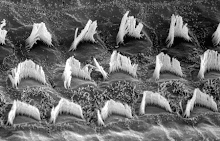 31.5 million people with hearing loss - Hearing Loss Association of American
31.5 million people with hearing loss - Hearing Loss Association of AmericanThere are only 16,000 microscopic auditory hair cells in a human cochlea, the cochlea is our main hearing organ.
Auditory hair cells are located in the organ of Corti of the cochlea, and they are involved in detecting sounds. Auditory hair cells convert sound information into electrical signals that are sent via nerve fibers to the brain and processed. Vestibular hair cells are located in the vestibular (balance) organs of the inner ear (utricle, saccule, ampullae). They detect changes in head position and send this information to the brain via nerve fibers. This information is used to help maintain body posture, eye position and balance. Without auditory or vestibular hair cells, the energy derived from sound waves or gravity is not converted into neural signals, and hearing or balance deficits ensue.
Damage to hair cells can be caused by a number of agents, including loud sound, ototoxic drugs (some antibiotics and anti-tumor drugs), disease, and processes associated with aging. In humans hair cell damage results in permanent hearing impairments and/or balance disorders.
It is upsetting that many U.S. soldiers and Marines have acquired hearing loss who only want to serve their country and parturient and make our lives better. Please read the following link: http://www.cbsnews.com/stories/2008/03/08/health/main3919311.shtml
The effects hearing loss has on people with it:
Social effects
The person withdraws from his/her surroundings
The 'personality' changes
Conversations become shorter, less frequent, less spontaneous and less personal
The person has become less attentive and/or avoids social gatherings and noisy surroundings
Reduced social contact and less social and physical activity
Loss of intimacy
Problems at work
Sexual problems
Common psychological consequences
Shame, guilt and anger
Embarrassment
Lack of concentration
Sadness or depression
Worry and frustration
Anxiety and suspiciousness
Insecurity
Self-criticism and low self-confidence
In 1986 it was discovered that chickens can restore their hair cells after exposure to loud noise restoring their hearing back to normal. That hard started the research into developing a treatment/cure for hearing loss.
Many researchers are looking into regenerating hair cells by gene therapy and stem cells. The list of stem cells that they are looking at for possible treatment are: embryonic stem cells, placenta stem cells, umbilical cord blood stem cells, bone marrow stem cells. Some researchers have been successful in restoring hearing to deafen mammals by using gene therapy and stem cells.
Many researchers are looking into regenerating hair cells by gene therapy and stem cells. The list of stem cells that they are looking at for possible treatment are: embryonic stem cells, placenta stem cells, umbilical cord blood stem cells, bone marrow stem cells. Some researchers have been successful in restoring hearing to deafen mammals by using gene therapy and stem cells.
I have spend several months doing research and contacting doctors/scientist around the world on the progress of when it will be possible to try and treat humans instead of animals. Edwin Rubel at University of Washington claimed to me to be one of the worlds leading hearing research laboratory stated, "It will happen, but whether it is 8 years or 50 will depend on money, attracting dedicated and talented people and luck. What is needed now is sufficient support to sustain groups of scientists using many approaches for significant amounts of time."
Please leave a comment explaining your situation, how you acquired hearing loss, and the effects it has on your life. I am hoping this will let the researchers how important this study is and to help support them to speed up the progress and bring it into human clinical trial. (I will continue to up this blog the more information I learn)
